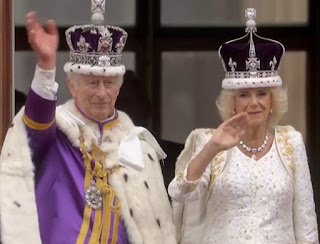The first hymn included the word plenteousness; why would anyone begin a solemn occasion with a word nobody can pronounce?
O pray for the peace of Jerusalem,The king was welcomed by "the children of the Kingdom of God," a phrase I'm pretty sure never appeared in the coronations of the kings I studied. (That would be Henry III and Edward I, II, and III.) On the other hand the oath still has some of the good old language:
They shall prosper that love thee.
Peace be within thy walls,
and plenteousness within thy palaces.
The Archbishop: Will you solemnly promise and swear to govern the peoples of the United Kingdom of Great Britain and Northern Ireland, your other realms and the territories to any of them belonging or pertaining, according to their respective laws and customs?
The King: I solemnly promise so to do.
Very important for a proper monarch to govern all his peoples according to their own customs.
The Archhbisohp: Will you to your power cause law and justice, in mercy, to be executed in all your judgements?
The King: I will.
And to do justice with mercy.
It took the archbishop a strangely long time to get the crown straight on Charles' head; maybe they don't actually practice that, because he can't wear the crown until the coronation?There was some controversy about this next bit; instead of just asking the peers of the realm to swear fealty to Charles, it was mooted that they might invite the whole realm to do so. But that was too widely mocked so they settled on this:
I now invite those who wish to offer their support to do so, with a moment of private reflection, by joining in saying 'God save King Charles' at the end, or, for those with the words before them, to recite them in full.One of the interesting thing to me about this event was how many Americans seem to have found it absolutely bewildering. This image tore around Twitter, universally accompanied by a joke about the Holy Hand Grenade of Antioch. Really, people, has the orb of sovereignty become so obscure?
The coronation ode, by the Poet Laureate, celebrates some of the 450 ordinary heroes who were invited.
Anyone care to speculate on what this event will look like next time?










1 comment:
And can somebody explain to me how Mordaunt got to be a name?
The name is clearly established to date back to the Normans, and the conquest of 1066.
As for the meaning, there appear to be two major theories.
The first is that it derives from the French mordre, through Old French and Vulgar Latin, ultimately from the Latin mordeo / mordere - "to bite", although also by extension, such other meaning as "to sting", "to nip", "to consume", "to take hold of", "to hurt", and even "to waste", among a variety of other similar usages.
Drawing from the pre-French traditions of the Normans, it may well have been a name that some Viking warrior earned through their behavior - perhaps they literally bit someone in a brawl; perhaps they were figuratively compared to a predator like a wolf latching onto their enemies; perhaps it was a poetic description of some who seized and conquered land; etc. Compare to names like Ivar The Boneless, Sigurd Snake-In-The-Eye, Halfdan Whiteshirt, etc.
The other argument is for it being derived from a place name - a branch of the Mordaunt family in the 14th century resided in Mordon (or Morden), in present day County Durham, England. It has been suggested that the name of the place may once have been Moredun, or "moor-hill" / "moor-fort".
Post a Comment